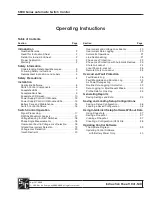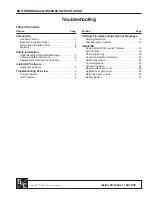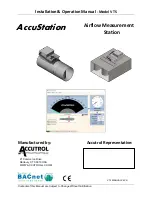
36
I20683 - Subject to change.
Installation Instructions
Mechanical Installation
Figure A Universal Clamp and IND-AF2 Position
Indicator (optional)
3. If the clamp is not on the correct side as determined in step
#1, re-mount the clamp as follows. If it is on the correct
side, proceed to step #5. Look at the universal clamp. If
you are mounting the actuator with the “CCW” side out,
position the clamp so that the pointer section of the tab is
pointing to 0° (see Fig. C) and the spline pattern of the
clamp mates with spline of the actuator. Slip the clamp
over the spline. (Use the same procedure if the “CW” side is
out.) If your application requires a mechanical minimum
position, read the Rotation Limitation section.
4. Lock the clamp to the actuator using the retaining clip.
5. Verify that the damper is still in its full fail-safe position (a).
6. Mount the spring return actuator to the shaft. Tighten the
universal clamp, finger tight only.
7. Mount the anti-rotation strap at the base of the actuator.
Slip the stop of the anti-rotation strap in the slot of the base
of the actuator. The stud should be centered approximately
1/4” from the end of the slot. Do not tighten the screws.
8. Remove the screw from one end of the mounting bracket
and pivot it away from the actuator.
9. Loosen the universal clamp and, making sure not to move
the damper shaft, rotate the actuator approximately 5° in
the direction which would open the damper.
10. Tighten the universal clamp to the shaft.
11. Rotate the actuator to apply pressure to the damper seals
(b) and re-engage the anti-rotation strap (c).
12. Tighten all fasteners.
Short Shaft Installation
If the shaft extends at least 3/4” from the duct, follow these
steps:
1. Move damper blades to the fail-safe position (a).
2. Determine the best orientation for the universal clamp on the
back of the actuator. The best location would be where you
have the easiest access to the V bolt nuts on the clamp.
3. Engage the clamp to the actuator as close as possible to
the determined location.
4. Lock the clamp to the actuator using the retainer clip.
5. Mount the spring return actuator to the shaft. Tighten the
universal clamp, finger tight only.
6. Mount the anti-rotation strap at the base of the actuator.
Do not tighten the screws.
7. Remove the screw from one end of the mounting bracket
and pivot it away from the actuator.
8. Loosen the universal clamp and, making sure not to move
the damper shaft, rotate the actuator approximately 5° in
the direction which would open the damper.
9. Verify that the damper is still in its full fail-safe position.
10. Tighten the universal clamp to the shaft.
11. Rotate the actuator to apply pressure to the damper seals
(b) and re-engage the anti-rotation strap (c).
12. Tighten all fasteners.
30
20
10
0
CCW
30
20
10
0
-5
Correct clamp mounting
position if actuator is at
full fail-safe.
40
30
20
10
0
-5
40
30
20
10
0
-5
Correct pointer mounting
position if actuator is at
full fail-safe.
CW
CCW
CW
Figure B
R
5
°
M
1
2 S1
S2
(CO
M)
(+)
M a
d e
i n
S w
i t z
e r l
a n
d
30
40 50
60
70
80
25…
85
°
90
80
7
0
60
0
-5
L
C
9
8
-5
b
c
a
CW
1
2
3
4
5
6
7
8
9
0
1/4” [6.35 mm]
Summary of Contents for TRANE TAF Series
Page 7: ...Notes Work Pad 7 I20683 Subject to change...
Page 27: ...27 I20683 Subject to change TAF Notes Work Pad...
Page 57: ...57 I20683 Subject to change TLF Notes Work Pad...
Page 73: ...73 I20683 Subject to change TTF Notes Work Pad...
Page 98: ...98 I20683 Subject to change Notes Work Pad...
Page 165: ...165 I20683 Subject to change Wiring Guide Notes Work Pad...
Page 166: ...Notes Work Pad 166 I20683 Subject to change...
















































